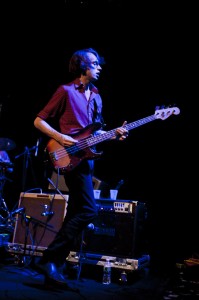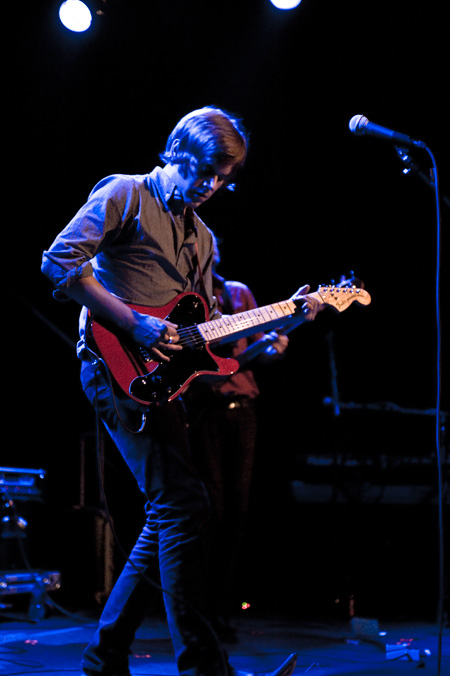We love touring and playing live – It’s a really honest way of doing it.
You may well get a feeling of de ja vu upon hearing the name 22-20s. Don’t panic though, your instincts are still intact. After all, this is their second outing. Having endured an interesting career thus far the 22 20’s have finally buried hatchets and let bygones be bygones.
Whilst most kids were revising and sitting exams these lads were out on the road playing blues clubs and festivals. This was a good education for them as Blues was the passion they followed. But they found this scene a tad restricting as most attendees were over 50 and had their own idea how their beloved Blues should sound – not appreciating the extra chords and licks this bunch of kids were offering. This prompted them to elaborate on the theme and led them to record a demo featuring future hits “Devil in Me” & “Such A Fool“. This edgy blues/rock sound catapulted them into the mainstream with early comparisons to U.S rockers The Strokes and The White Stripes. The lads were still in their teens.
In hindsight this may have been the undoing of them, as is the case with a lot of young acts, although these days they do get a little more schooling on how to cope with these life changes. After a brief hiatus they took stock of what they had – a great sound and a large following – and decided to attempt things from their own angle.
As with a lot of things in life timing is of the essence and the 22-20s were spot on. With the recent resurgence of garage rock music they formed a cartel with like minded bands such as, The Whigs, Band of Skulls, Cage The Elephant & Alberta Cross, who are now ripping venues up the world over.
 Armed with the release earlier this month of new album “Shake/Shiver/Moan” they played their 2nd New York gig in as many months, lending support to Alberta Cross at the Music Hall of Williamsburg. The fans reacted well to the showcase of the new album. “Latest Heartbreak” opened a few eyes and ears with its pounding drum intro flipping quickly into a revved up guitar feud between Trimble & Bartup. “Shake, Shiver & Moan” is more melodic, showing they can write a love song and have a sensitive side but true to form it does end in a guitarfest. Saving songs of old until the end brought a smile to many faces. “Devil in Me” & “Such A Fool” took the revved up crowd back to the beginning, back in time to the birth of a band who, almost surely, will defy musical longevity. Trimble chucked his guitar on the ground and walked off stage having gained a hoard of new fans – fans who were left wishing this was only the beginning of the set.
Armed with the release earlier this month of new album “Shake/Shiver/Moan” they played their 2nd New York gig in as many months, lending support to Alberta Cross at the Music Hall of Williamsburg. The fans reacted well to the showcase of the new album. “Latest Heartbreak” opened a few eyes and ears with its pounding drum intro flipping quickly into a revved up guitar feud between Trimble & Bartup. “Shake, Shiver & Moan” is more melodic, showing they can write a love song and have a sensitive side but true to form it does end in a guitarfest. Saving songs of old until the end brought a smile to many faces. “Devil in Me” & “Such A Fool” took the revved up crowd back to the beginning, back in time to the birth of a band who, almost surely, will defy musical longevity. Trimble chucked his guitar on the ground and walked off stage having gained a hoard of new fans – fans who were left wishing this was only the beginning of the set.
All in all it seems the 22-20s have matured well with age. “Shake/Shiver/Moan” shows they’ve spent time perfecting their craft, proving them a class act and in no way one dimensional.
The Album is available in digital download format, CD and LP on the band’s website – www.22-20s.com
The band was kind enough to sign the brand new CD and album release poster for us. Register to win these special ‘Shake/Shiver/Moan’ items retweeting this feature story using the retweet button at the end of the article! A winner chosen at random will be notified via twitter.
Live4ever sat down with Martin and Glen from the 22-20s before the show and in advance of the second of back to back consecutive US tours – this time in support of Cage the Elephant.
L4E: Evening guys, how’s everything?
22-20s: Good, yeah.
L4E: You just came from Canada where you had a few dates, right? – How was that? Shitty?!
22-20s: Nah, there weren’t enough Canadians! We were supposed to go up there with Alberta Cross and for some reason they ended up not going, but we decided to do a few dates anyway. There was only about 30 or 40 people at the gigs which was alright I suppose. So, there just weren’t enough Canadians really!
L4E: Introduce the band for our readers by explaining who each of you are and what you do in the band?
Glen: Well, I’m Glen and I play bass.
Martin: And I’m Martin and I play guitar and sing. James plays drums and Dan plays guitar and sings.
L4E: So, in the recent documentary film ‘It Might Get Loud’, there’s a part where Jack White takes out a 45 and plays it on a turntable. He says since he first heard the song, it has been his favorite. The song is by Son House, an old blues musician with whom I’m sure you’re familiar as you named your band after a song by one of his contemporaries, Skip James. Is that correct?
Glen: Yeah, ‘22-20 Blues’.
L4E: Any particular reason for naming your band after that song?
Glen: Well, we didn’t name the band until we actually had some gigs where we were going to be playing our own stuff. James had joined by that point and we were hanging about the village I used to live in one day and we had to come up with a name in about 20 minutes!
Martin: Yeah, I think we wanted our sound to be quiet aggressive – we probably did then, more than we do now. We were probably a bit more raw then. And so the nature of that song, even though it’s a piano based song, is kind of like that. It’s got an aggressive lyric and we just liked the sound of it.
L4E: So, you two are really the backbone of the band in a way – you’ve been friends since you were young lads. Tell us about the early days. We read you toured parts of Europe playing Blues cover songs when you were sixteen or seventeen? Is that right?
Martin: Yeah, sixteen or seventeen we were. But even at that age I think we realized it was a blues scene we didn’t really want to be part of. It seemed like it was mostly forty-five to fifty year old British guys who had watched ‘The Blues Brothers’ and they had their pork pie hats and harmonicas… And we didn’t want to do that. We were listening to a lot of stuff like ‘R.L. Burnside’ and a lot of these hill country Mississippi Blues players. And it’s pretty stripped back and raw and it had kind of a hypnotic groove to it, stuff like ‘Johnny Lee Hooker’, and we were always into that kind of stuff more than the more clichéd kind of ‘Blues’.
We ended up doing a tour around Holland and Belgium and we started throwing some of our own stuff into the set, like ‘Devil In Me’ and ‘Such a Fool’, some of the stuff that is on the first record. And these guys were saying, ‘this is not blues, this is rock n roll’. They were quiet funny about it. It was a funny scene. So, we had about enough of it then and we felt that what we were doing we could play in front of a younger crowd. ‘The White Stripes’ had done that John Peel session, before they broke really, and we could relate to that. With the stuff we were playing we could relate to the younger people. James joined at that point and that’s where it really got started.
L4E: You wrote those songs ‘Devil In Me’ and ‘Such a Fool’ at that point, when you were sixteen or seventeen?
Glen: Nah, we were probably like eighteen by that time. It all really kicked off when were eighteen or nineteen really.
L4E: Well, regardless – some pretty solid tunes for a couple of young lads! In fact, some of those songs got you a few publishing deals, right?
Martin: Yeah, we were just playing similar stuff to the stuff we were listening to. We didn’t think it was that great or radically different or anything. And we were kind of astounded when Jeff Barrett down at Heavenly started listening to us, and NME started playing us. Suddenly my Mum was fielding calls from Sony! It was just a bizarre situation. I mean it was just a three or four track demo we’d done and ultimately we could’ve done with having that natural growth as a band, where there’s that gradual build-up. We think we could’ve been better off because we were never quite sure of ourselves early on and I think that’s why it took a long time to record the first record, and ultimately why we ended up splitting up for a while – It was all a bit too soon for us.
Glen: The demo was what got us signed, and was the first batch of songs we’d ever written together because we’d always been doing that blues and covers thing up until then. So, we were in out of our depth before we really had any idea of what we were doing. We had an idea of how we wanted to sound and if we had to have spent another six months writing it would have done us the world of good.
L4E: Really? Yeah, we read that it was the “bidding war of the century” trying to sign you guys! Was it true you were being flown over to the States to meet record execs etc.?
Martin: I think the people that took us on at the time, everyone older and wiser that was around the band, could have handled it better because we did fly out to meet these people and do these things and it just put more pressure on the situation than there needed to be at the time. And we were a bit too naïve to stand up and say we wanted something different.
Glen: We ended up signing a record deal a year and a half after that demo and we were touring because we’d done that publishing deal and it paid for the touring and some other things. But we ended up signing with Jeff Barrett, who was the first guy we met anyway. He was the guy who essentially we always wanted to sign with. So, looking back the year and a half was kind of wasted time as we could’ve been writing the album and all the other stuff we really should have been doing.
Martin: Are you depressed yet?!
L4E: No, not at all. Your story is intriguing. Here you are, a couple of young lads from small towns in Lincolnshire, who started playing music around the age of fourteen and a few short years later you write a couple of great tunes and something happens that you weren’t quite expecting. And then following the year and a half of unnecessary fanfare, you signed with someone you always wanted to sign with and this was someone who shared your passion for music.
Martin: Yeah, Jeff was totally different. He got us into soul – these kind of rare Motown tracks. He was an absolute nut about American soul music basically. So it’s true, a lot of people took us out to dinner or tried to do something impressive, whereas Jeff would just get us down to the office and we’d hang out there till three or four in the morning listening to all these records. So, we knew from a very early stage that we wanted to sign with Jeff. Of course, the people around us at the time kept saying you got to check out this and check out that and it just became a load of bullshit that we just didn’t need really.
L4E: So, would Jeff’s label Heavenly be considered an ‘indie’ label or is there some link to EMI or someone else?
Glen: Well, they started out as an indie label and then they spent some time where they did some deals with various majors. They were with EMI at the time we signed with them. I think they’re independent again now, I believe…
L4E: What do make of this whole ‘indie’ scene or whether there is a scene or what does it mean?
Martin: I guess indie has become more about the sound rather than the meaning. It’s hard to know really. In the eighties, indie meant independent didn’t it?
 Glen: I don’t think the distinction bothers me really. If you can record an album and you can have the input of those who ‘get’ the kind of music you want to make and are willing to tell you that you might be going in the wrong direction with something, like Jeff and the people we work with now, rather than working with those people who are thinking about radio play and things like that, then I think you’re going to make better music and whether you find a great little label that’s part of a major or an indie label, it doesn’t really matter to me. Essentially you just want to make records and have somebody release them and have us deal with as little bullshit as we possibly can.
Glen: I don’t think the distinction bothers me really. If you can record an album and you can have the input of those who ‘get’ the kind of music you want to make and are willing to tell you that you might be going in the wrong direction with something, like Jeff and the people we work with now, rather than working with those people who are thinking about radio play and things like that, then I think you’re going to make better music and whether you find a great little label that’s part of a major or an indie label, it doesn’t really matter to me. Essentially you just want to make records and have somebody release them and have us deal with as little bullshit as we possibly can.
L4E: Brendan Lynch produced your first album, right? He’s someone who has worked with bands that you are fans of. How was that experience and how was it working with Ian Davenport on the new album by comparison?
Martin: Brendan was brilliant, actually. He got it didn’t he? (Looking for Glen’s approval). He was great to work with. But I don’t think we were in the right state of mind to make the type of record we really wanted to make. I feel it should have been really striped back, really raw. But that wasn’t his fault. It was the songs we delivered but there’s maybe four or five good songs on that record.
But I think where the difference lay this time had a lot got to do with our mindset and not with the producer. Ian took quite a role on this record. We had started writing much more melodic stuff as a reaction to the last record and we were listening to bands like ‘Big Star’ and all that kind of thing and Ian actually guided us back to, what he thought, was the essence of the band. And he’d stick us in a room and just make us play and jam things out and get ideas out like that. So, songs on the record like ‘Talk to Me” and “Latest Heartbreak”, the more kind of raw stuff came later on and I think that’s his influence.
L4E: Well, it’s a great album lads.
Martin: Ahh, thanks a lot!
L4E: Tell us about playing live and touring. How has that been? Do you like touring?
Martin: We love it! Although I might be only saying that now, it might be different in two months but so far we love it.
Glen: Yeah, it’s good fun touring and playing live. I think it’s also important for a band like us because we’re not going to get played on the radio and the only way we can make an impact on people is to go out and tour and by playing gigs and bring them to the records that way. Someone is more likely to see us live and buy the record than hear the record on the radio and then come to the live gig after that.
Martin: It feels like a really honest way of doing it as well. And I think in the past, with the first record people were saying we’ve got to get this song or that song on the radio and that almost seems like a cheap way of doing it and it’s kind of like you’re building your house on the sand. Like, last night we played Boston for the second time now and thirty odd people came back because they’d seen us the first gig and it feels like we’re doing it the right way. It’s a really good feeling.
L4E: You seem to have put a lot of emphasis on not only playing live but recording and releasing it. Is that something you feel you’ll continue doing?
Glen: I think this time it was about releasing something to help get people into the band. We reckon playing live is a bit of a strength of ours. But I don’t think it’s been a conscious decision. The label might say, let’s put out a live EP and we’ve been happy to do it.
L4E: (Well, we feel we can’t get enough live music playing on our iPods! It’s quite a different experience. ) Have you recorded live using tape either on this album or the last?
Glen: It’s kind of half and half. There are some songs on there that were written as they were recorded because it kind of necessitated that. Probably about half the album was recorded when we were all in the room.
L4E: How do you feel about the new album Martin? I read you wanted to make a record you could be proud of regardless of whether you sold one copy or not.
Martin: Well, I don’t think it’s the definitive record for us but you get where we’re going with things. There’s a lot of melody and it’s interesting because of that. I was worried that there wouldn’t be a strand that would go through the record that would tie the tracks together but there is. I’m a lot happier than I was with the first record. We enjoyed making this record. There was no pressure like there was with the first album – we were 18 year olds then! I do like the sound of this record. It describes where we’re at in terms of the sounds we’re going for and I think it’s interesting because of that even though I don’t think it’s the best record we’re going to make.
L4E: You mentioned The White Stripes earlier in terms of artists you’ve been compared to. I feel your voice, Martin, on more than a few tracks, reminds me of Lou Reed. Are you comfortable with these kinds of comparisons?
Martin: Well, I don’t think Lou Reed would be very comfortable! And The White Stripes one early on was just lazy journalism really, on the part of NME. We were supposed to be like this British equivalent but I don’t think we sounded a great deal like them to be honest. In fact, if you listen to The Black Keys, which came out afterwards, I think it’s probably a little closer to that. We don’t look at it like it’s a big deal though.
L4E: Switching gears a bit – Do you think it’s ok if some kid in Russia illegally downloads your EP or album and gets to enjoy your music that way, or would you prefer if you were able to sell it?
Glen: I’d rather they just got into it. That’s what’s important. If they’re into it and we tour there and bands like us can make a living that way I think that’s what is important. But I mean, I’ve downloaded music the last few years, living in London absolutely skint! So, I couldn’t criticize anyone for doing something that I’ve done myself.
L4E: You’re back in New York for the second time this year. Was it here that the band decided to split a few years ago? How is it being back?
Glen: We love New York. We came here to record the second album, the first attempt at the second album. James and I moved out here, Martin was living here already and we tried to record the album. It was a non-starter really. By that point we had no idea what we were going to sound like, so after about a month we called it a day. I think we were relieved to call time on it at that point. It wasn’t going anywhere and we weren’t writing any songs. But I don’t associate that with New York.
L4E: With all the touring you’ve done are there any towns, venues or fans that stand out?
Glen: Chicago has always been good. We enjoyed Seattle, although last time we were there we were awful, but that was five years ago!
Martin: New York is the place that feels like the big one.
L4E: From a band perspective, do you notice a difference between the venues? Take for instance the difference between The Bowery Ballroom and Music Hall – fans say Music Hall’s sound is much better.
Martin: You don’t really notice when you’re on stage.
Glen: That’s the funny thing, the last time we were here we played both venues and I actually enjoyed the Bowery much more, personally, but everyone that knew us that was here (Music Hall) said it was infinitely better. You’re at the mercy of how is sounds out front though. It shouldn’t matter to us when we’re playing.
L4E: How about the crowds in Europe versus America – Noel Gallagher said in an interview that you have to be more on top of your game here in the States more so than in Europe as the crowds are somewhat semi-geeky. They’re into your equipment, instruments and they watch the settings on your amps and they know if you make a mistake. So, he says he like playing here because you cannot have an off night. Do you see a difference?
Glen: I totally agree with that, to an extent.
Martin: Yeah, in England you can get a buzz going straight away and be a big band and get on the radio and all that without having to work hard and play a shit load of gigs. I’m surprised how sloppy bands are sometimes, when I go around London and see bands. A classic example of what you’re talking about is with a band we toured with, The Whigs. They’re not a ‘big band’ but they’re just incredibly tight and they play like that every night. And there’s obviously more of an emphasis on that in America and there’s probably more of an emphasis on musicianship here too, just because of the history here of having Jazz, Blues and Country and people who can really play.
Glen: On the flip side I think there can be too much emphasis on musicianship because the main focus has got to be the song. I don’t get any kick out of seeing a great guitarist or great drummer. I like seeing great bands, like Creedance where its really simple and it’s not just a display of technical proficiency. A lot of it has to do with, not just the groove but, the band.
L4E: Thanks a lot lads. All the best with the rest of the tour!




